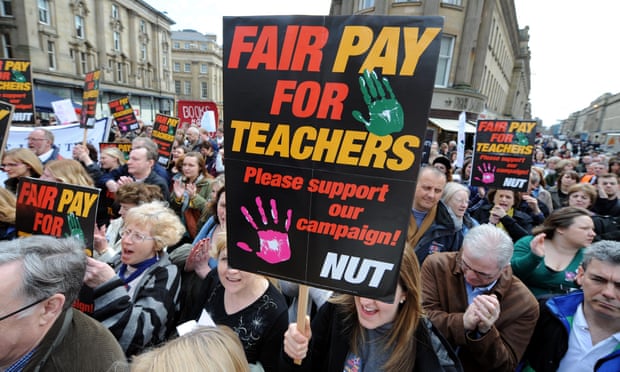By: Michael Savage.
Recruitment slumps as figures show a 10% fall in salaries since 2003
Ministers have conceded that teachers’ pay has fallen by thousands of pounds a year since the public spending austerity drive began, amid warnings of a “looming crisis” in attracting and retaining new staff.
Classroom pay has fallen by more than £4,000 a year since 2010 in real terms, according to a government assessment. Damian Hinds, the education secretary, warned that only a 2% increase can be expected for the next academic year.
The admission comes in the Department for Education’s official submission to the School Teachers’ Review Body, which makes recommendations on pay deals. It states that pay is also lower than it was 15 years ago in real terms. “From 2002-03 to 2017-18, classroom teacher median salaries have seen a drop of 10% and overall teacher median salaries of 11% in real terms,” it says. It argues that the fall was smaller than that suffered by private sector graduates.
Mary Bousted, joint general secretary of the National Education Union, said: “We welcome the DfE’s admission that teachers’ pay has fallen so far in real terms. It is no good Damian Hinds trying to argue that this is the same for private sector jobs – those figures reflect the many graduates forced into low-paid, part-time, semi-casual jobs, whereas we are talking about the pay rates being offered to those joining a profession.”
The number of secondary school pupils is forecast to rise by 15% during the next decade. However, the government missed its recruitment targets for trainees for the past six years, with the biggest shortfalls in key subjects like maths, modern foreign languages and physics. Ministers have responded with a series of measures designed to ease the pressures with job shares, more support for new staff and a reduction in paperwork.
James Zuccollo, from the Education Policy Institute, said there was evidence that “targeted pay increases” could greatly reduce the looming crisis. “Recent research suggests a 5% pay supplement for early-career science and maths teachers could have avoided the increased shortages since 2010, for instance,” he said.
“The government’s new bursary scheme for early-career teachers may help to tackle acute retention problems in shortage subjects and disadvantaged parts of the country. But, unless it is applied immediately to existing teachers, it is likely to be a few years before we see any improvements to exit rates.”
Hinds has announced that English schools will no longer be punished for failing to meet government standard on tests, in an attempt to release teachers from the stress of results and stop schools with challenging pupils from being punished. He also wants to cut down on marking, data collection and lesson planning.
However, Angela Rayner, the shadow education secretary, said years of cuts had led to teachers being “thousands of pounds a year worse off. Across our schools we are seeing the result in the crisis in teacher recruitment and retention. Teacher recruitment targets have been missed year after year, with more teachers leaving the profession than joining. In response to this crisis, the government will give the majority of teachers another real-terms pay cut.”
Labour is pledging to end the public sector pay cap with additional, ring-fenced funding.
School leaders have been angered by a suggestion last week that they will have to fund this year’s pay increase from their existing budget, without extra help from the government. A note from the department warned: “A pay increase for teachers of 2%, in line with forecast inflation, is affordable within the overall funding available to schools for 2019 to 2020, without placing further pressure on school budgets.”
A Department for Education spokesperson said: “Last summer saw the biggest teacher pay rise in almost 10 years, worth between £800 and £1,366 for classroom teachers and supported by a £508m government grant. In addition to an annual pay award, many teachers also receive increases from promotions and responsibility allowances.
“Whilst we know pay is an important issue for teachers, there are also other factors which can affect recruitment and retention. That is why in January we unveiled the first ever integrated recruitment and retention strategy in England, which will provide teachers with more early careers support and opportunities for flexible and part-time working. The strategy also builds on the work we have done to support school leaders to strip away unnecessary workload.”
Source or the article: https://www.theguardian.com/education/2019/feb/09/teacher-pay-down-real-terms-since-2003








 Users Today : 57
Users Today : 57 Total Users : 35460440
Total Users : 35460440 Views Today : 102
Views Today : 102 Total views : 3419265
Total views : 3419265